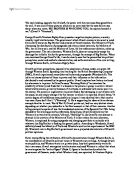Consider the political implications of seeing and being seen in Nineteen Eight-Four and The Orchard, focussing on one passage or scene from each book, and one relevant image or written text you collect from print media.
Essay One:
The Orchard and Nineteen Eighty-Four both describe cultures that “encourage us to see ourselves as others see us”. Consider the political implications of seeing and being seen in Nineteen Eight-Four and The Orchard, focussing on one passage or scene from each book, and one relevant image or written text you collect from print media.
The Orchard, Nineteen Eighty-Four and Doug’s Story, all describe cultures that have both subservant characters as well as dominant ones; creating an unequal society. The political figures affect how the individuals see themselves; through many techniques including creating institutions, generating propaganda, having constant surveillance and interpellation of genders. I endeavour to examine each of these tools on their success to affect their victims and influence the society.
Nineteen-Eighty Four is a dramatic novel which examines Orwell’s speculation of a possible future under a communist-dominated regime. It eliminates freewill “there will be no thought, as we understand it now. Orthodoxy means not thinking-not needing to think. Orthodoxy is unconsciousness.” The political implications of seeing and being seen in 1984 is that due to constant surveillance and brainwashing, someone’s perception of reality can be altered, so that they truly believe they are living in utopian society, which is actually dystopic. Through habit and not knowing any better, individuals copy each other: as a satisfied conformist who does not have emotions except their love of Big Brother. Nineteen-Eighty Four does describe a culture that “encourages us to see ourselves as others see us” This is Big Brother’s powerful role as the watcher, that everyone one will match each other; as a modelled citizen representing Big Brother’s ideology. Victims reflect what everyone else is doing eg yelling during Two Minutes Hate; otherwise they are punished eg. the stretch exercises, when Winston is reprimanded by the instructor for not touching his toes properly, he is aware of being seen, so “touches his toes”, showing that surveillance works from fear, as he does what he was told. During this he realises that he must remain inscrutable “for a single flicker of his eyes will give him away” this was called facecrime. Winston believes his worst enemy was his “nervous system, at any moment the tension inside you was liable to translate itself into some visible symptom.” As Winston is a different individual.
Winston final reformation pg. 310-311, shows the success of seeing and being seen as a method of controlling people. After torture and rehabilitation, Winston ultimately betrays himself and extinguishes all his dignity. We meet him at the Chestnut café, where he is now a ‘perfected’ robot Big Brother has ‘cured’. Winston sees himself as Big Brother wishes, he now has no individual identity; revealed in the simile “his soul white as snow” lacking its previous impurities and originality. Big Brother is symbolised as white and Winston is black, the last humanist or enemy of Big Brother “ black horde”, expressed in the extended metaphor of the chess game; in which Winston subconsciously cannot defeat the black, he keeps getting distracted “could not settle down to the serious study of the chess problem”. This is because he is now brainwashed to believe “in no chess game has black ever won.” Evidently showing, that Winston is still subconsciously fighting the battle against Big Brother. This is symbolic to the whole book of Winston struggle to be “black.” Propaganda is shown through vivid imagery on pg 310 “Triumphant phrases... complete demoralisation…control of whole of Africa…greatest victory in human history… victory, victory, victory”, with all “truths” being pushed into victims minds. Revealing how political implications are used by Big Brother to manipulate its population. This was Winston previous political job at The Ministry of Truth to “update” files to get them to comply with Big Brother’s beliefs “Who controls the past controls the future: who controls the present controls the past”. With the victory over the Eurasian army; Winston expresses that he now feels “healed”, he was now in a “blissful dream”, a meaningless, dead and empty body of cells “nothing mattered.” In the last paragraph, Winston creates pathos through emotive words and repetition of “O”, where he expresses how foolish it was to resist. It had taken him forty years to see himself as a conformist “needless misunderstanding”. He should not have been so “stubborn” and “self-willed” as an exile of Big Brother. Who can be symbolised as his father, “it is not enough to obey Big Brother you must love him”, an allusion to the stereotypical role of the father: all-knowing, who teaches, protects, educates, provides, and punishes. This is also evidenced in “The Chestnut Café” with an allusion to the nursery-rhyme symbolising that Winston is now a child-like being with a lost soul as his priorities and beliefs were crushed into thin air. He is just another “cog in the wheel” of the machine which is Big Brother.







